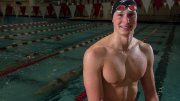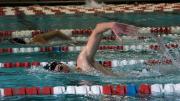His childhood swim coach was always careful not to lay too heavy a burden on Dean Farris by telling him just how good he was going to be. But Mike Norment knew. Farris ’20—whose rookie season with Harvard last year included a string of broken records, a fourth-place finish in the NCAA tournament, and one particularly beautiful, breathtaking win in the 200-yard freestyle at the 2017 Ivy League championships—was just nine years old the first time Norment saw him swim. Farris had been competing in summer leagues around Atlanta since he was seven, and he’d recently begun swimming year-round. “From the first lap, I was taken aback at how talented he was,” says Norment, himself a former world-ranked swimmer and a member of the U.S. national team. Farris was a skinny kid, tall for his age, a jumble of right angles. Still, Norment says, “He was very aware of his body. It’s like recognizing a mathematical genius at nine years old. You could see he’d figured it out.” Farris moved through the water like someone who was seven or eight years older.
Under Norment, for whose club team he swam throughout high school, Farris won two junior national championships and two Georgia state titles, and qualified in four events at the 2016 Olympic trials. Now, a decade later, he’s grown to six feet, seven inches, and, in the year and a half since arriving in Cambridge, he’s added more than 30 pounds of muscle to his frame. In his first year, he found a prominent place on Harvard’s roster as a short- to mid-distance swimmer, from 50-yard sprints relying on quick turns and bursts of power to 200-yard races requiring a little more pacing and endurance. In the season’s first meet, he took individual wins in the 100-yard freestyle and 100-yard butterfly against Dartmouth and Cornell; after that, he rarely failed to take first place anytime he was in the pool. He finished the regular season with 12 individual wins in dual meets. The Crimson’s relay unit, on which Farris won a spot, never lost during the regular season.
The climax, though, was last year’s Ivy championships in February, which Harvard hosted at Blodgett Pool. The craziness of that week didn’t really hit Farris until later. In the moment, as he and his teammates were winging their way from one end of the pool to the other, dominating almost every opponent in almost every event on their way to Harvard’s first conference title since 2014, a weird calm took over. “It just kind of seemed normal,” Farris says, “because that’s how our season was going.” He won seven events, including that 200-yard freestyle, which he finished more than two seconds ahead of the second-place swimmer. By the second lap, the race was basically decided; after that, it was just a matter of seeing how fast he would be. His final mark was 1:31:56—the fastest in college swimming that season. (That earned Farris a top seed in the NCAAs a month later, where he finished fourth in the 200 free behind three former Olympians.)
The Crimson walked away with 1,705 points that week, the most in Ivy championship-meet history and 370 more than runner-up Penn. Farris won the Phil Moriarty Award as the high-point swimmer. “We basically didn’t even have to show up the last day to win,” he says, with wonder more than swagger. “It was just incredible.”
That’s the kind of joy that Ulen-Brooks coach Kevin Tyrrell describes in his standout sophomore. “Dean is smiling on the pool deck when he walks in at 6:30 in the morning,” Tyrrell says. “He’s happy to be there, he wants to learn, he wants to make good stuff happen.” Coaching him is as much a Socratic exercise as a prescriptive one: “A lot of conversations, a lot of questions”—about how to be more efficient, how to generate more power, how to fine-tune his form. “We’re trying to help him develop his own awareness,” Tyrrell says, “because he’s got to be able to think and make decisions out there based on the race that he’s in and the training that he can take advantage of.”
Norment has similar recollections. In 2013, having coached for several years at the club where he first saw Farris, Norment left to start his own swim program, Metro Atlanta Aquatic Club. Farris and a handful of other swimmers followed their coach. The team was tiny at first. Five of them had grown up together in the pool, a tight-knit little unit. “And they all looked the same: they were bony, they were skinny, and they had no body strength,” Norment recalls. “Couldn’t do a pull-up. But they looked really good in the water.” And they showed up every single day. “If the pool was closed for whatever reason, they would immediately text me and say, ‘Coach Mike, can we go to the Y and do a workout?’ So they were committed, and their families were committed.” Two years later, four of those swimmers made the Olympic trials…“and Dean was at the center of that. In terms of his ability to outwork and outthink everybody that he’s trained against—he finds a way. He’s a quiet, low-key kid, but he’s a fierce competitor, at all times. He’s willing to hurt more than the person in the lane next to him. That’s what makes him different.”
Farris remembers the year he decided to go all in on swimming. He’d been splitting his time between the pool and the soccer field, where he played goalie. By the time he was 12, it got to be too much. His parents (athletes themselves, who’d played football and volleyball in college) left the choice up to him. Farris loved soccer, but he suddenly realized that he couldn’t imagine his life without swimming. “It keeps me grounded,” he says. “What I love about swimming is that the hard work you put into it shows at the end of the year. There are no secrets about how to get faster.” That fact buoyed him when he was 14 and 15, looking around at kids his age who were heftier than he was, and suddenly just as tall. “Those were frustrating years—everybody else grew and I kind of didn’t grow. But I had a good work ethic, and so I kept getting faster.” And, eventually, taller.
At a mid-November practice at Blodgett Pool, two days ahead of the Crimson’s road trip to Columbia for the second meet of this season, that work ethic was on display. So was his speed. This was a “threshold practice,” conducted at race pace, and swimmers pounded out laps, their shoulders heaving when they touched the wall and lifted their heads out of the water to rest or to listen for guidance from Tyrrell and assistant coach Samantha Pitter.
Last year, Farris swam mostly backstroke and freestyle, two strokes requiring especially strong balance and the ability to stay horizontal in the water. “That’s where I excelled,” he says. But this season, he wants to expand his range, compete in individual medley races that use all four strokes; that’s how he swam in high school, all options open. “It keeps the mind fresh,” he says. “I think I’m going back to the mentality of swimming everything, rather than focusing on one or two things, because I think it makes me better. You don’t get burned out.” In heat after heat with his teammates at the November practice, Farris swam the gamut: freestyle, backstroke, butterfly, breaststroke. Most of the time, he was out in front of the others, often by a body length or more, arms slicing in and out of the water as he churned forward, arching toward another finish.










